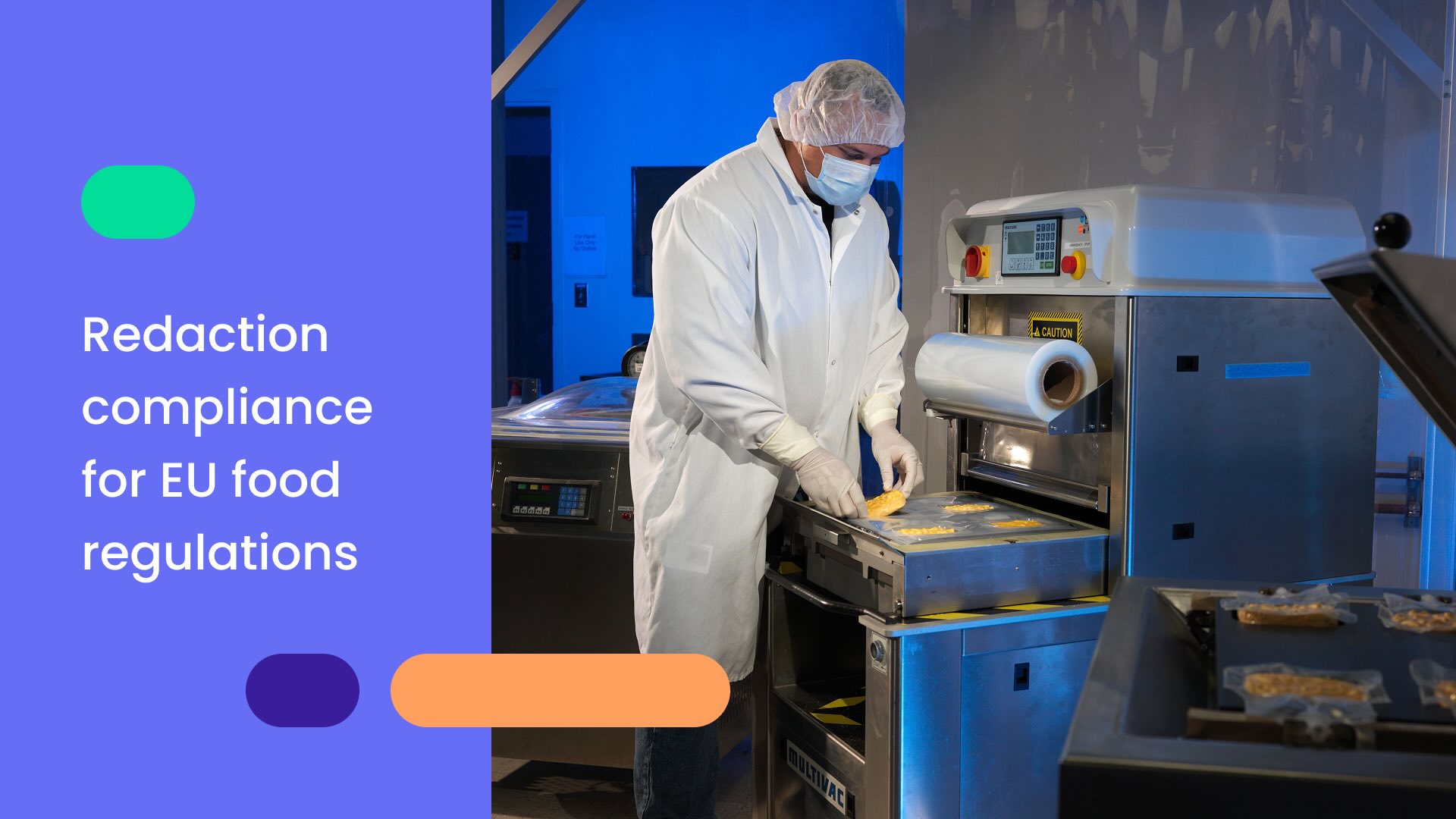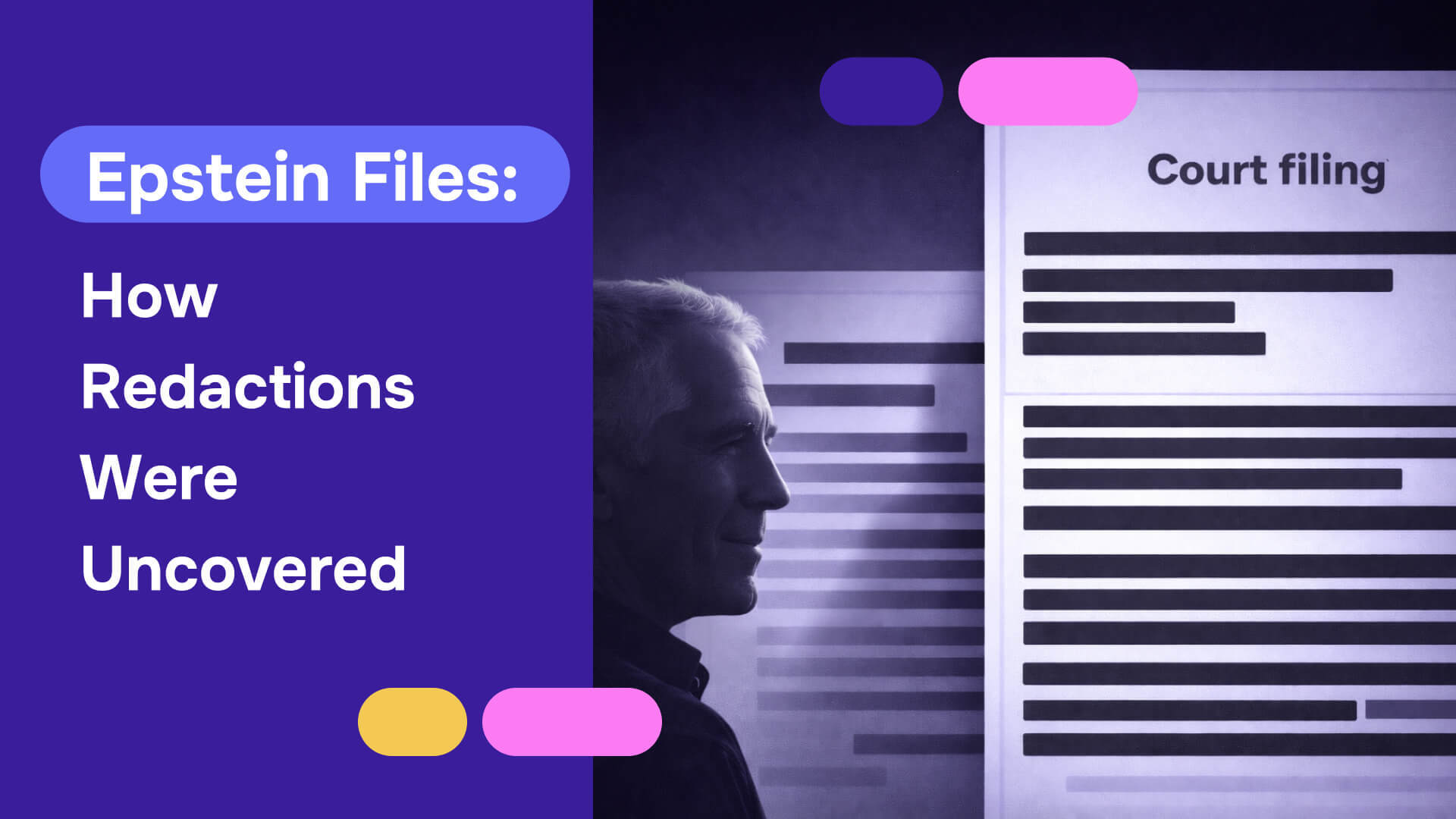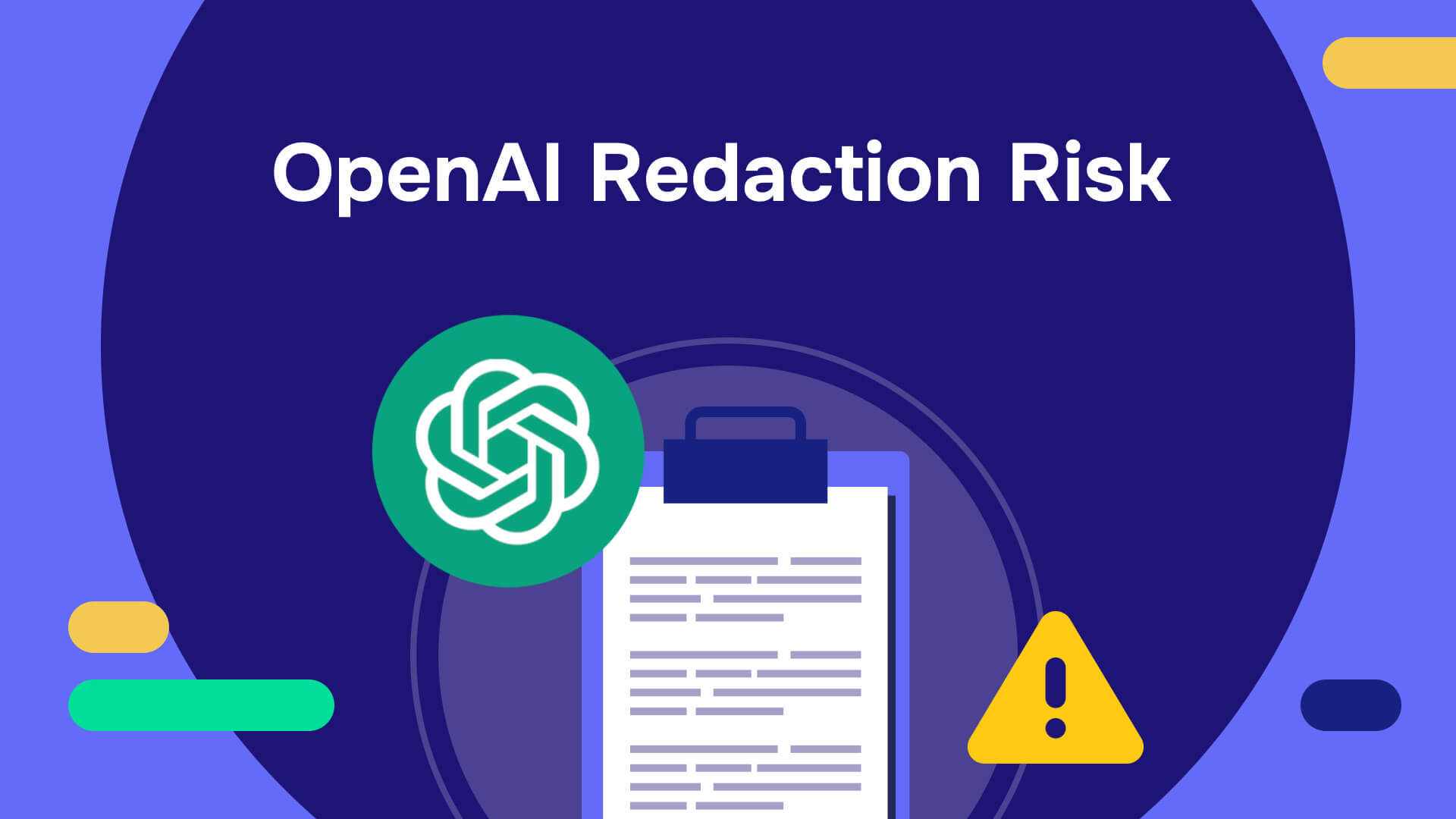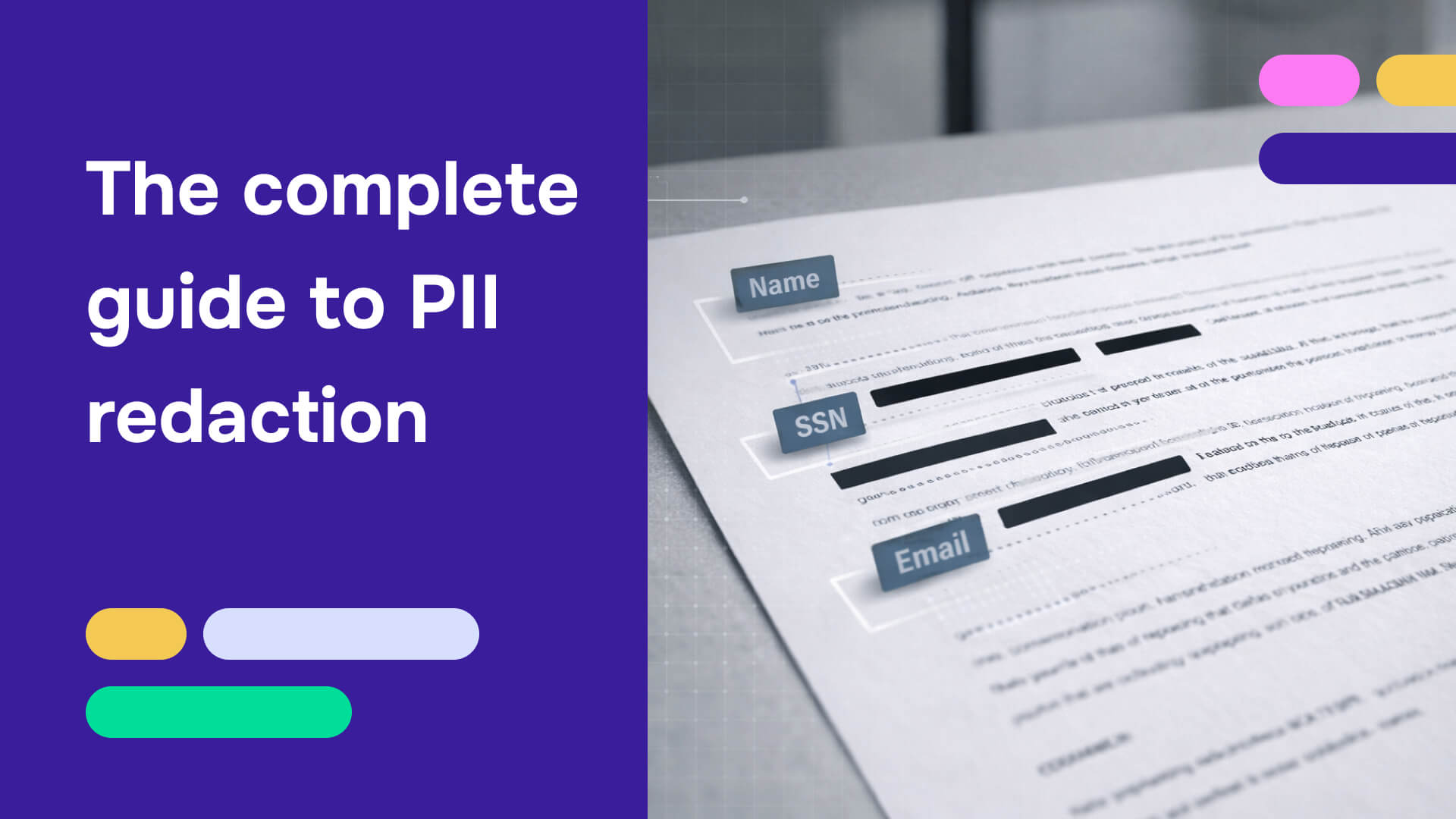Food businesses operating under the EU food regulations face complex redaction requirements across multiple frameworks. GDPR Article 32 mandates secure processing of personal data through proper redaction techniques. The EU Transparency Regulation requires systematic redaction of confidential business information before EFSA publishes food safety dossiers. Meanwhile, the General Food Law allows companies to request confidentiality protection for trade secrets, but only with proper justification and documentation.
Manual redaction methods expose food companies to significant compliance risks, potential €20 million GDPR fines, and competitive disadvantages from inadequate protection of proprietary information. Automated redaction platforms eliminate these risks while ensuring audit trail compliance across all regulatory requirements.
Food companies across the EU navigate an intricate web of redaction requirements that span data protection, food safety law, and trade secret preservation. These regulations create overlapping compliance demands where a single document might require different redaction approaches for GDPR personal data protection, EFSA transparency requirements, and confidential business information safeguards.

GDPR Article 32: Security foundations for food data processing
GDPR Article 32 requires controllers and processors to implement appropriate technical and organizational measures to ensure data security, including pseudonymization and encryption of personal data, maintaining ongoing confidentiality and integrity of processing systems, and establishing processes for regularly testing security measures.
For food businesses operating under EU food regulations, this translates into strict redaction requirements across multiple document types. Clinical trial data supporting health claims must have all participant identifiers removed. Supply chain documentation containing employee names, contact information, or other personal details requires comprehensive redaction before any regulatory submission or public disclosure.
The regulation emphasizes that security measures should ensure appropriate levels of confidentiality, taking into account implementation costs and the nature of personal data being protected. Food companies handling sensitive health data, genetic information from agricultural research, or biometric data from safety studies face particularly stringent requirements.
Common GDPR redaction failures in food documentation
Food businesses frequently underestimate the scope of personal data requiring protection. Investigation reports from contamination incidents often contain employee statements, witness accounts, and internal communications with personal identifiers. Supplier audit reports include inspector names, contact details, and sometimes photographs that constitute personal data under GDPR definitions.
The regulation's broad definition creates redaction challenges across seemingly routine documents. FOIA requests for food safety inspection reports, recall notices, and contamination investigations all require systematic personal data removal while preserving public safety information.
Read also: GDPR redaction guidelines: Disclose information safely
EU Transparency Regulation: Balancing openness with trade secret protection
The EU Transparency Regulation, which entered force on March 27, 2021, requires EFSA to automatically publish all studies and information supporting food safety applications, with exceptions only for duly justified confidential information.

This represents a fundamental shift in food industry data handling. Under the Transparency Regulation, scientific data, studies, and information supporting applications to EFSA are made public proactively at the early stages of risk assessment, giving citizens access to information that was previously kept confidential.
This creates specific redaction challenges for companies trying to remain compliant with Europe food regulations. Companies can request confidentiality protection for manufacturing processes, commercial relationships, market strategies, and proprietary formulations. However, confidentiality requests require verifiable justification demonstrating how disclosure would significantly harm business interests, and information relevant to safety assessment cannot be protected.
Transparency Regulation redaction requirements
The EFSA must be notified of all studies performed, started, or commissioned after March 27, 2021, to guarantee that companies submit all relevant information without excluding unfavorable studies. This notification system creates additional redaction complexities, as companies must prepare both confidential and non-confidential versions of study notifications.
The regulation mandates that companies submit both confidential and non-confidential versions of petition dossiers to EFSA, with the non-confidential version published on EFSA's OpenEFSA Portal when petitions are validated. This dual-document requirement demands precise redaction strategies that protect legitimate business interests while meeting transparency obligations.
Food businesses must redact specific categories of confidential information:
- Manufacturing processes and innovative technical specifications
- Commercial relationships between suppliers, importers, and authorization holders
- Market share data, sourcing strategies, and competitive business information
- Quantitative composition details (unless relevant to safety assessment)
General Food Law Article 39: Strategic confidentiality protection
Article 39 of the General Food Law allows applicants to request confidential treatment for information where disclosure would potentially harm their interests to a significant degree. This protection mechanism requires sophisticated redaction strategies that balance transparency obligations with legitimate business confidentiality.
Confidentiality requests may only be submitted for items included in the closed positive list provided in EFSA's Practical Arrangements, and each request must demonstrate how disclosure would significantly harm business interests.
The regulation establishes a detailed review process where EFSA assesses confidentiality claims within 10 weeks of submission. Companies can challenge EFSA's decisions through confirmatory applications and ultimately through the European Court system if confidentiality protection is denied.
Article 39 redaction strategy considerations
Successful confidentiality protection requires strategic thinking about which information truly merits protection versus standard transparency expectations. Food companies, operating under Europe food regulations, often over-redact routine information that doesn't qualify for confidentiality protection, creating unnecessary delays and review burdens.
The regulation's "significant degree" standard demands concrete evidence of competitive harm. Companies must demonstrate specific business impacts from disclosure, not generic concerns about competitive disadvantage.

Manual redaction risks in food industry compliance
Traditional redaction methods do not meet the standards set by modern EU food regulations and food safety law. Black markers and PDF overlay boxes don't permanently remove sensitive information - they merely hide it visually while leaving underlying data accessible to sophisticated retrieval methods.
Metadata exposure threatens food industry confidentiality
Most food industry documents contain extensive metadata that reveals author identities, revision histories, document sharing patterns, and collaboration networks. This hidden information can expose internal decision-making processes, identify key personnel involved in sensitive projects, and reveal business relationships that companies seek to protect.
Regulatory submissions often include documents created across multiple organizations—research institutions, testing laboratories, contract manufacturers, and consulting firms. Each document layer adds metadata that can compromise confidentiality if not properly removed during redaction.
Audit trail failures in manual processes
EU food regulations demand comprehensive audit trails documenting redaction decisions, justifications, and reviewer identities. Manual redaction processes struggle to maintain consistent documentation standards across complex regulatory dossiers that may contain thousands of pages across multiple document types.
The Transparency Regulation's notification requirements and confidentiality assessment processes create additional audit trail demands that manual systems cannot efficiently manage. Companies need systematic approaches for tracking redaction decisions, version control, and reviewer approvals across lengthy regulatory timelines.
Automated redaction: Compliance assurance for food industry regulations
Modern automated redaction platforms are designed for the food sector to help ensure compliance with EU food regulations by detecting sensitive content, removing it permanently, and generating audit-ready records. These systems recognize that food industry redaction requires more than simple text masking - it demands intelligent understanding of regulatory contexts and document relationships.

AI-powered recognition of food industry data types
Advanced redaction platforms can identify food-specific sensitive information patterns: product formulations, supplier relationships, manufacturing process details, clinical trial participant data, and proprietary research methodologies. This targeted recognition capability ensures comprehensive protection while minimizing over-redaction that could delay regulatory approvals.
The technology adapts to food industry document structures - from clinical study reports supporting health claims to manufacturing process descriptions in novel food applications. AI detection can distinguish between information that requires protection under different regulatory frameworks and apply appropriate redaction strategies accordingly.
Permanent redaction with metadata removal
Professional redaction platforms ensure complete data removal, including hidden metadata, version histories, and embedded objects that manual methods leave exposed. This permanent redaction capability is essential for food industry compliance where incomplete data removal can expose trade secrets or violate GDPR requirements.
The technology addresses food industry document complexity by removing sensitive information from charts, graphs, analytical reports, and technical specifications while preserving document functionality and regulatory compliance requirements.
Comprehensive audit trails for regulatory compliance
Automated platforms generate detailed redaction certificates documenting every modification, reviewer decision, and justification basis. These audit trails align with food industry regulatory requirements for documented decision-making processes and provide evidence of compliance diligence during regulatory reviews or enforcement actions.
Transform food industry redaction compliance with automated solutions
Companies face escalating redaction complexity as EU food regulations evolve toward greater transparency while maintaining protection for legitimate business confidentiality. Manual redaction methods cannot scale to meet these demands while ensuring compliance across GDPR, Transparency Regulation, and General Food Law requirements.
Automated redaction platforms provide the precision, audit trail documentation, and permanent data removal capabilities that modern food industry compliance demands. By automating redaction workflows, food companies can focus resources on core business objectives while ensuring regulatory compliance across all EU jurisdictions.
Book a demo with our team to see how Redactable transforms food industry compliance with 98% time savings and automated regulatory protection. Start your free trial today.







